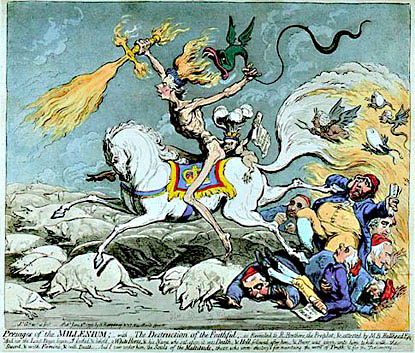
English 4/805B: Nineteenth Century Fiction:
Fiction of the Romantic Period
Fall 2002

Stephen C. Behrendt
319 Andrews; 472-1806
office: 10:00 -11:00 TR
and by appointment
James Gillray, Presages of the Millenium (1795)
Some ideas for group presentations on the authors whose novels we are reading (Godwin, Hays, Austen, P. B. Shelley, Mary W. Shelley)
What follows on this page are suggestions for three general ways to approach your group presentation. Your group should collectively choose one of these as a sort of "center" for the focus of your presentation, although you are free to include elements from the others, as well as to pursue another alternative approach altogether.
Formal considerations:
What is revealed in the opening chapters (or even chapter–or even pages–or even the first page) about:
– setting
– characters, as well as characterization (i.e., how characters are presented to the reader, including literary devices the author employs)
– the narrator's perspective on, and relation to, the events of the novel
– literary style, including type and level of language, "readability," use of figurative language, use(s) of dialogue, etc.
– the apparent theme of the novel
– central ideas or preoccupations (both of the characters and of the author as best you can tell), as they are revealed early in the novelNow consider these same matters as they appear throughout the entire novel. In particular, consider any significant changes in any of the elements, either of the story (and its characters, plot, and settings) or of the novel as a literary work (including matters of style as well as intellectual or matters of theme, attitude, or philosophy of the author as best you can determine).
Include in your discussion what you regard as the most important events that occur in the novel, and be ready to explain why they seem to you to be especially important.
Literary/Intellectual/Aesthetic Considerations:
Why has this novel come to be considered either "good," or "important," or both (or, alternatively, why has it not generally been seen in these lights?)? What aspects or features of it would you cite to support your opinions? How would you argue the case for including this particular novel in a course that surveys the history of the English novel? Are there "extra considerations" – matters which lie outside the novel – that influence your judgment on this matter, and if so what are they?
Historical/Cultural Considerations:
1. Historical context. Situate the novel (and its author) within a historical context by discussing what was going on in England (and the world, as necessary) during the time of the novel's composition and publication. If there are "local" issues involved (anything happening in London or elsewhere in England that is particularly significant for the novel or its author, for example), you should identify and explain them.
2. Evidence of the author's social and cultural orientation. Provide evidence from the novel itself that reveals the author's beliefs, opinions, prejudices, preoccupations, etc. You may also wish to present evidence from the novel that reveals what the author considered to be her or his role as an author, as an artist, as a thinker, and (if relevant) as someone who aspired to exert some direct influence or bring about some particular end(s) specifically through the vehicle of prose fiction.
Some ideas for individual (or group) presentations
on the other authors listed
These reports are meant to fill in gaps and/or to provide additional information to help everyone learn about authors (and works) we will not all have time to cover in this course. What's needed in these reports is a brief account of the author and of her or his most important work(s). You should try to "place" the author – and her or his influence – both within the context of her or his own times and within the context of modern literary-historical views of the Romantic era.
Directions for HANDOUTS required for all presentations
Before you make your group presentation or your individual presentation,
you should prepare a handout to accompany your presentation and make sufficient
copies for everyone in the class. This handout should identify the principal
ideas and issues you will address in your presentation. It should also list
the specific, sharply focused questions which will be "answered" or
otherwise addressed in your presentation.
How this should all work – for each of you
Obviously, you will need to plan well for your presentation. I will expect all your presentations to be well informed, well organized, and made with the care, courtesy, and professionalism appropriate to any activity for which you share, collectively, responsibility for a major piece of classroom time. I will also expect audience members for each presentation to be equally well prepared to do their part to make the presentation a success, including asking good questions and behaving courteously and professionally.